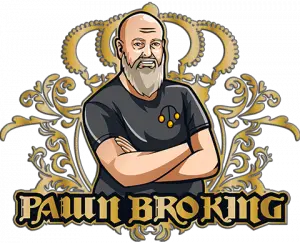Pawnshop loans are short-term, secured loans that require the pledge of some type of asset in exchange for money. However, whatever you use as collateral can vary somewhat.
You could trade in electronics or collectibles, a musical instrument, or an antique; however, as long as you pay your loan back on time and with interest, what you use as collateral is ultimately irrelevant.
How Do Pawn Shop Loans Work?
A pawn loan is a fast method to borrow money because it does not involve a credit check or application process, unlike a personal loan. The value of the thing you pledge is used to calculate your loan amount.
For example, if you have a name-brand guitar and bring it to a pawn shop, the pawnbroker may be able to determine its worth. The value of the guitar may then be assessed by the pawnbroker, who can provide you with a loan for up to the appraised value of the instrument.
Pawnshop loans are not the most popular form of lending, but they do exist. The rates on pawnshop loans are usually very high. This is one reason why several states have intervened to regulate the sector.
If you choose to borrow money from a pawn shop, you can usually get the money right now. You’ll generally be expected to repay the entire amount of the pawn loan to reclaim your pawned item, although the length of time required to pay back the loan varies by state.
For instance: In Florida and North Carolina, pawnshop loan contracts must be 30 days long and have an additional grace period. The typical pawnshop loan in the United States is $150, according to the National Pawnbrokers Association.
Pawnshops have modernized in recent years, with sites like Pawngo claiming they may lend up to $5 million for the right goods. You can pawn a range of high-demand assets, including rare coins and automobiles.
What Are The Advantages Of A Pawn Shop Loan?
- It is simple to get: In most cases, pawn loans are simple to obtain. All you have to do is bring in an item of value and ask for a loan.
- No credit check: Because your loan is secured by your item, you will not be pre-screened for excellent credit.
- You may give up your object to pay off your loan: Your credit score isn’t usually damaged if you default on payments, and you won’t be obligated to make them. The pawn shop just keeps your thing.
What Are The Drawbacks Of A Pawn Shop Loan?
- Relatively expensive: The interest rates and finance costs for a pawn loan vary between 5% and 25% every month. This is less expensive than most short-term lending choices, but other fees may raise the overall cost.
- You won’t get reimbursed for any extra money: If you don’t pay off your loan on time, the pawn shop may sell your goods. Even if your item is worth more than the amount you borrowed, the business may not be obliged to refund you for the profits.
- Additional charges: You may end up paying for insurance, storage, and other costs in addition to interest charges. Before you give them your valuable item, be sure you understand all of these expenses.
Rules And Regulations
Pawn America businesses must now follow a variety of state and local regulations, as well as 15 federal laws and rules.
They must submit transactional data on a regular basis to local authorities. The data is used to assure that they are not purchasing or pawning stolen goods.
They have their own National Pawn Association (NPA), which aids local owners to keep up with regulatory stipulations and provides other business assistance.
All NPA members agree to conduct their firm in a professional and positive manner, both inside and outside the industry.
The pawnshop business is a growing and bright, as well as attractive, marketplace in which to do business. There are over 10,000 pawnshops across the country.
Pawnbrokers are bound by the same federal legislation that applies to other financial institutions, including:
• Truth-in-Lending Act
• USA Patriot Act
• Trading with the Enemy Act and related Executive Orders and laws
• The Bank Secrecy Act and IRS rules that demand the reporting of certain currency transactions
• The Gramm-Leach-Bliley Financial Services Modernization Act’s privacy protections
Alternatives To Pawn Loans
Consider other alternatives before taking out a pawn loan:
- Sell the item instead: If the item you’re pawning is not valuable, it’s most likely best to sell it and get the money right away. Alternatively, you could seek a personal buyer. It may take more time, but you might make a little more money than a pawn shop can give if you look for a private buyer instead.
- Request bill forbearance: If you’re having trouble making your payments, contact your utility provider or lender to ask for bill deferment. Some may even be willing to discuss a different payment plan.
- Turn to community assistance: If you’re having trouble keeping up with your bills, see if any federal or state assistance programs might assist you to cope with basic expenditures.
- Ask friends or family for help: You’ll most likely discover that they are more than pleased to assist you in a financial crunch. Instead of having to pay high-interest rates, you may be able to obtain a loan for free.
- Call your bank or credit union: They frequently provide low-interest rates for short durations. However, it may be more difficult to qualify for a loan and your credit score will most likely be verified.
- Make extra cash in your spare time: Consider a side business to earn additional money if you have the time. Car and house sharing, selling surplus items, and market research are just a few possibilities.
- Get a short-term loan: With a short-term loan, you may borrow a little amount of money and return it in a brief period of time. However, while pawn loans don’t need collateral, they are likely to cost you much more in fees than a long-term loan would.
Conclusion
To be honest, you don’t want to get into a position where you have to pawn your family’s assets. But if you find yourself in need of fast cash and believe that a pawn shop loan is your only choice, do your homework and think about the alternatives before taking the plunge.
To know more about What Do Pawn Shops Buy click here.

Thomas Boseman is the author of Pawnbroking.com. A pawn shop owner by day, blog writer by night. When not writing, he enjoys exploring the outdoors with his dog, Roman. Thomas received his bachelor of arts in film from the University of Arizona. A Brooklyn native, Thomas is a lover of filmmaking, motorcycle, and coffee.
